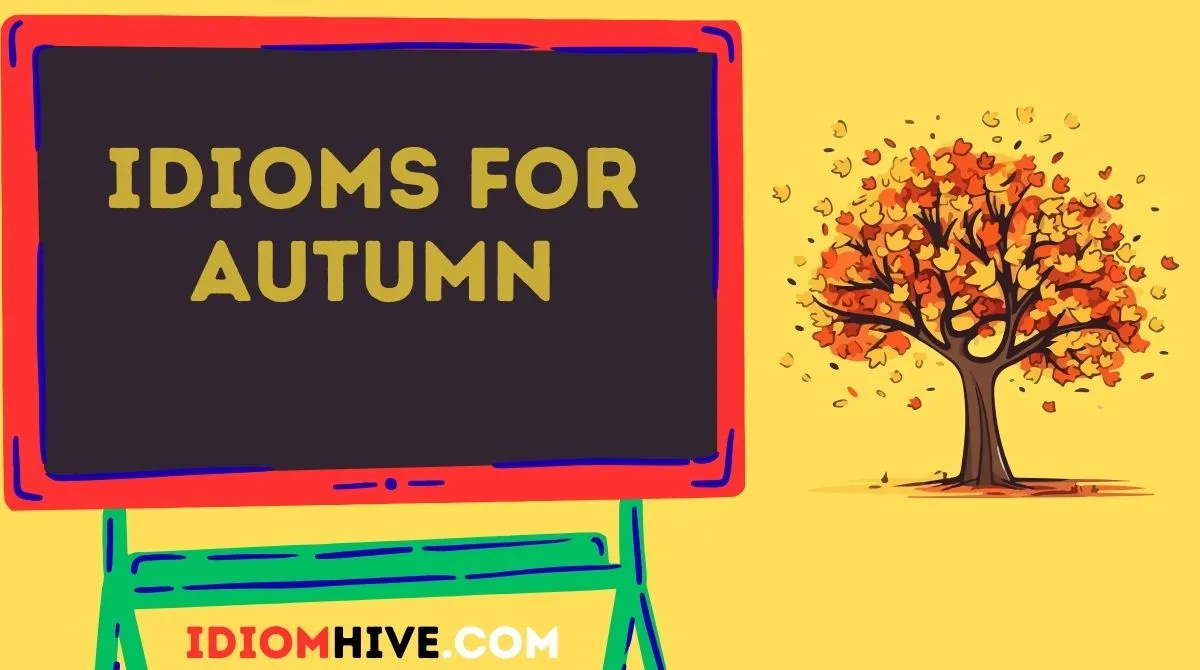Autumn, also called “fall” in American English, is a season full of change, colors, and transitions. In English, idioms often borrow imagery from nature and seasons to describe human emotions, life stages, or everyday situations.
Idioms are expressions that don’t mean exactly what the words say but instead carry a figurative meaning. For example, saying someone is “turning over a new leaf” doesn’t mean they are flipping a real leaf—it means they’re starting fresh.
Idioms for autumn are particularly useful because they reflect themes of change, maturity, endings, and preparation for new beginnings.
These expressions can make your language more colorful, help you sound more fluent, and bring a poetic touch to your conversations.
Whether you are writing, speaking casually, or trying to add depth to your professional communication, autumn-inspired idioms can paint vivid pictures in the minds of your listeners or readers.
Did You Know?
The word “autumn” comes from the Latin autumnus, meaning “the passing of the year.” Many English idioms connected to autumn relate to change, harvest, or winding down—because historically, this season marked the end of farming cycles and preparation for winter.
Idioms About Change and Transition
Turn Over a New Leaf

Meaning: To start fresh or make a new beginning.
Example: After summer, she decided to turn over a new leaf and focus on her studies.
Alternative: Start from scratch.
Note: Common in everyday conversations when talking about personal improvement.
Fall into Place
Meaning: When things start to work out naturally.
Example: After months of preparation, everything began to fall into place.
Alternative: Come together.
Note: Used both formally and informally.
Change of Seasons
Meaning: A metaphor for life transitions or entering a new stage.
Example: Moving to a new city felt like a change of seasons in his life.
Alternative: A new chapter.
Note: Often used in reflective writing or speeches.
In the Autumn of Life
Meaning: Referring to someone in their later years.
Example: He wrote his memoirs in the autumn of life.
Alternative: Twilight years.
Note: More poetic, often used in literature or formal speech.
Fall Between the Cracks
Meaning: To be overlooked or forgotten.
Example: Some small details fell between the cracks during the project.
Alternative: Slip through the net.
Note: Common in professional or organizational contexts.
Second Spring
Meaning: Autumn is sometimes called the second spring, when every leaf is a flower.
Example: She found joy in the second spring of her life after retirement.
Alternative: A fresh bloom.
Note: Poetic, often in personal reflections.
Turn of the Season
Meaning: The transition period when things are about to change.
Example: The company was at the turn of the season, preparing for a new strategy.
Alternative: Turning point.
Note: Can be used metaphorically in business and life.
Falling Short
Meaning: Not meeting expectations.
Example: His autumn performance fell short of what the coach expected.
Alternative: Miss the mark.
Note: Common in evaluations or workplace settings.
Falling Out
Meaning: A disagreement or argument.
Example: They had a falling out over the group project.
Alternative: Rift.
Note: Informal, used in friendships or relationships.
Fall Into Step
Meaning: To start moving in harmony with others.
Example: The new employee quickly fell into step with the team.
Alternative: Get in sync.
Note: Often used in teamwork and collaboration contexts.
Idioms About Harvest and Abundance
Reap What You Sow
Meaning: You get results based on your actions.
Example: He didn’t study and now he’s reaping what he sowed.
Alternative: As you sow, so shall you reap.
Note: Common in moral or teaching contexts.
Harvest Time
Meaning: A period of collecting rewards for hard work.
Example: Autumn was harvest time for the farmers.
Alternative: Payoff time.
Note: Used literally in farming or metaphorically for success.
Apple of One’s Eye
Meaning: Someone very precious or loved.
Example: His granddaughter is the apple of his eye.
Alternative: Treasure.
Note: Informal and affectionate.
Bear Fruit
Meaning: To produce results.
Example: Her efforts in training finally bore fruit.
Alternative: Pay off.
Note: Often used in professional contexts.
Gather Nuts for Winter
Meaning: Prepare and save for harder times.
Example: The company gathered nuts for winter by saving profits.
Alternative: Save for a rainy day.
Note: Common in financial advice.
Indian Summer
Meaning: A period of unexpected warmth in autumn or a late success in life.
Example: He enjoyed an Indian summer in his career with a bestselling book.
Alternative: Late bloom.
Note: Poetic, often reflective.
Autumn Harvest
Meaning: Collecting benefits after effort.
Example: The business reaped its autumn harvest of profits.
Alternative: Rewards of labor.
Note: Metaphorical and formal.
Squirrel Away
Meaning: To store something secretly for later use.
Example: She squirreled away money for her trip.
Alternative: Tuck away.
Note: Informal and common.
Full Basket
Meaning: A situation of abundance.
Example: His autumn was a full basket of achievements.
Alternative: Plenty in hand.
Note: Poetic and descriptive.
Golden Season
Meaning: A time of prosperity and beauty.
Example: Her teenage years were the golden season of her life.
Alternative: Prime time.
Note: Poetic, often used in literature.
Idioms About Decline and Endings
Fall From Grace
Meaning: To lose respect or status.
Example: The politician fell from grace after the scandal.
Alternative: Lose standing.
Note: Formal, used in media and discussions.
Leaf by Leaf
Meaning: Slowly or gradually.
Example: The truth came out leaf by leaf.
Alternative: Piece by piece.
Note: More poetic or literary.
Shed Like Autumn Leaves
Meaning: To let go or release something no longer useful.
Example: She shed her worries like autumn leaves.
Alternative: Cast off.
Note: Poetic and reflective.
Bare Branches
Meaning: A time of emptiness or loss.
Example: After losing his job, he felt like his life had bare branches.
Alternative: Empty season.
Note: Metaphorical, used in personal contexts.
Chill in the Air
Meaning: Tension or unease.
Example: There was a chill in the air after their argument.
Alternative: Cold vibes.
Note: Informal, conversational.
Season of Decline
Meaning: A period of loss or downturn.
Example: The company entered its season of decline after the merger.
Alternative: Downfall.
Note: Formal and descriptive.
Fade Like Autumn Leaves
Meaning: To disappear slowly.
Example: His childhood memories faded like autumn leaves.
Alternative: Slowly vanish.
Note: Poetic usage.
Autumn Years
Meaning: Later stage of life.
Example: She found peace in her autumn years.
Alternative: Golden years.
Note: Common in literature and speech.
Wither Away
Meaning: To weaken or slowly disappear.
Example: His enthusiasm withered away over time.
Alternative: Die down.
Note: Informal but descriptive.
Falling Like Leaves

Meaning: To lose many things at once.
Example: Customers were falling like leaves after the price hike.
Alternative: Dropping out.
Note: Informal, sometimes dramatic.
Idioms About Beauty and Reflection
Autumn Glow
Meaning: A soft beauty or charm seen later in life or career.
Example: She radiated an autumn glow at her retirement party.
Alternative: Inner light.
Note: Poetic and reflective.
Autumn Breeze
Meaning: Something refreshing and gentle.
Example: His kind words were like an autumn breeze.
Alternative: Breath of fresh air.
Note: Common in informal speech.
Colors of Autumn
Meaning: Variety or richness in experience.
Example: Her stories brought the colors of autumn to life.
Alternative: Rich palette.
Note: Used poetically.
Golden Leaves
Meaning: Something precious yet fleeting.
Example: Their friendship was like golden leaves in the sun.
Alternative: Fleeting treasure.
Note: Poetic and reflective.
Fall Back On
Meaning: To rely on something in hard times.
Example: She could always fall back on her savings.
Alternative: Depend upon.
Note: Common in daily life.
Crisp as Autumn Air
Meaning: Fresh, sharp, or clear.
Example: His speech was as crisp as autumn air.
Alternative: Sharp and fresh.
Note: Descriptive, informal.
Rustling Leaves
Meaning: Quiet movement or whispers.
Example: She heard the rustling leaves of gossip around her.
Alternative: Whispering winds.
Note: Literary and imaginative.
Autumn Sunshine
Meaning: Warmth that comes after coldness.
Example: His kindness was like autumn sunshine in her life.
Alternative: Gentle warmth.
Note: Poetic and reflective.
Falling for Someone
Meaning: To develop romantic feelings.
Example: She realized she was falling for him during autumn.
Alternative: Crush.
Note: Informal and common in relationships.
Turning Colors
Meaning: A change in appearance or attitude.
Example: His mood was turning colors like the leaves.
Alternative: Shifting hues.
Note: Poetic expression.
How to Use These Idioms in Daily Life
- Speaking: Use idioms in conversations to sound natural. For example, instead of saying “I will start again,” you can say, “I’ll turn over a new leaf.”
- Writing: In essays, blogs, or creative writing, autumn idioms add imagery and depth. For example, “Her career entered an Indian summer of success.”
- Professional Use: In business, idioms like “bear fruit” or “fall into place” are effective to describe results and progress.
Common Mistakes Learners Make With Idioms
- Wrong Meaning:
❌ He turned over a new leaf of paper.
✅ He turned over a new leaf in his life. - Too Literal:
❌ The company harvested apples of success.
✅ The company reaped the harvest of their hard work. - Mixing Idioms:
❌ He fell between the cracks of life like autumn sunshine.
✅ He fell between the cracks because no one noticed him.
FAQs
1. What are idioms for autumn?
Idioms for autumn are expressions that use fall-related images like leaves, harvest, or seasonal change to describe emotions, life stages, or situations.
2. Why should I learn autumn idioms?
They enrich your vocabulary, make your speech colorful, and help you connect with native speakers more naturally.
3. Are autumn idioms formal or informal?
Some are informal (like “falling for someone”), while others are poetic or formal (like “in the autumn of life”). Context decides usage.
4. Can I use autumn idioms in professional writing?
Yes. Phrases like “bear fruit” or “fall into place” are common in workplaces and professional documents.
5. Do British and American English use the same idioms?
Mostly, yes. The only difference is that British English prefers “autumn,” while American English often uses “fall.”
Conclusion
Autumn idioms bring richness, depth, and beauty to English. Just as the season paints nature with vibrant colors, these expressions color your language with meaning and imagery.
From describing change and endings to highlighting abundance and reflection, idioms for autumn can make your speech and writing more engaging.
Mastering them not only improves fluency but also helps you connect emotionally through language. So, the next time you write or speak, let these autumn idioms fall into place and add a golden glow to your English.










